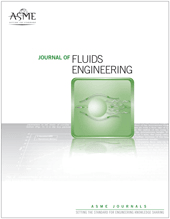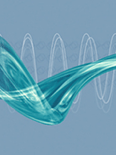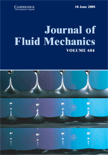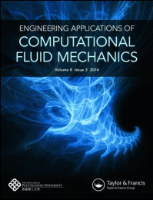
Fluid Dynamics
metrics 2024
Pioneering insights in mechanical and fluid phenomena.
Introduction
Fluid Dynamics is a distinguished journal that has been at the forefront of research in the field of fluid flow and transfer processes since its inception in 1966. Published by MAIK NAUKA/INTERPERIODICA/SPRINGER, this journal serves as a valuable platform for engineers, scientists, and researchers dedicated to advancing the understanding of mechanical and fluid dynamic phenomena. With a Q3 ranking in key categories such as Fluid Flow and Transfer Processes, Mechanical Engineering, and Physics and Astronomy, Fluid Dynamics holds a significant position in the academic community, attracting submissions that push the boundaries of knowledge and application. Although it does not currently offer open access options, the journal is recognized for its robust editorial standards and impactful contributions to the field, making it essential reading for anyone involved in fluid dynamics research. Given its consistent publication through to 2024, Fluid Dynamics continues to inspire innovation and collaboration in an ever-evolving scientific landscape.
Metrics 2024
 0.36
0.36 1.00
1.00 0.80
0.80 28
28Metrics History
Rank 2024
Scopus
IF (Web Of Science)
JCI (Web Of Science)
Quartile History
Similar Journals

JOURNAL OF FLUIDS ENGINEERING-TRANSACTIONS OF THE ASME
Pioneering Innovations in Fluid MechanicsJOURNAL OF FLUIDS ENGINEERING-TRANSACTIONS OF THE ASME, published by the renowned American Society of Mechanical Engineers (ASME), stands as a pivotal platform for disseminating cutting-edge research in the field of mechanical engineering, specifically focusing on fluid mechanics and its diverse applications. With an established history dating back to 1897, this journal features research that pushes the boundaries of knowledge and technology in areas such as fluid dynamics, thermal engineering, and hydrodynamics. Although it is not an open-access journal, it maintains rigorous peer-review standards, ensuring the publication of high-quality scholarly articles that contribute to the academic and professional community. In the latest rankings, it holds a respectable position within the Q2 category of mechanical engineering journals, reflecting its significant impact, as evidenced by its Scopus rank of #204 out of 672, placing it in the 69th percentile. Researchers, professionals, and students alike will find this journal to be a vital resource for the latest developments and innovative insights in fluids engineering.

JOURNAL OF ENHANCED HEAT TRANSFER
Elevating Standards in Mechanical Engineering and Fluid DynamicsThe JOURNAL OF ENHANCED HEAT TRANSFER, published by BEGELL HOUSE INC, is a prominent resource for researchers and professionals in the fields of mechanical engineering, fluid flow and transfer processes, and condensed matter physics. With a history spanning from 1993 to 2024, this journal offers a platform for disseminating cutting-edge research and innovations that enhance our understanding of heat transfer phenomena. Although it operates under a traditional subscription model, its impressive standing is underscored by its Scopus rankings—positioned within the 59th percentile for Mechanical Engineering and 58th percentile for Fluid Flow and Transfer Processes. Additionally, it holds Q2 and Q3 categorizations in relevant fields, reflecting its importance in advancing knowledge and applications in heat transfer technology. This journal effectively bridges the gap between theoretical insights and practical solutions, making it an indispensable tool for academics, industrial practitioners, and students eager to explore advancements in thermal management and efficiency.

INTERNATIONAL JOURNAL OF HEAT AND FLUID FLOW
Contributing to Excellence in Mechanical Engineering ResearchFounded in 1979, the INTERNATIONAL JOURNAL OF HEAT AND FLUID FLOW is a premier publication in the fields of mechanical engineering, fluid dynamics, and heat transfer, published by Elsevier Science Inc. With an impressive impact factor and ranking in the Q1 category for Mechanical Engineering and Q2 for Condensed Matter Physics and Fluid Flow and Transfer Processes, this journal is highly regarded for its rigorous peer-reviewed articles that contribute significantly to the advancement of knowledge in these critical areas. Researchers, professionals, and students can access cutting-edge studies that explore the intricacies of thermal and fluid systems, ensuring they stay at the forefront of scientific exploration. The Scopus rankings further affirm its role as a leading source of impactful research, with significant placements in crucial academic categories. Join an active community of scholars committed to innovation and excellence in the exploration of heat and fluid flow phenomena.

International Journal of Fluid Mechanics Research
Elevating Scholarly Communication in Mechanical EngineeringThe International Journal of Fluid Mechanics Research, published by BEGELL HOUSE INC, is a pivotal platform for the dissemination of innovative research within the fields of Mechanical Engineering and Physics. With a focus on the intricate dynamics of fluid behavior, this journal has been a cornerstone of scholarly communication since its inception in 1996, continuing to engage a global audience of researchers and professionals through to 2024. With a respectable Impact Factor reflecting its significant contributions to the disciplines—ranking in Q3 for both Mechanical Engineering and Miscellaneous Physics and Astronomy categories—this journal presents a unique opportunity for authors to share their findings in a peer-reviewed environment. Although it does not currently offer Open Access options, all published articles are carefully curated, ensuring high-quality research is accessible to its readership. As the journal navigates the complexities of fluid mechanics, it fosters an interdisciplinary dialogue, bridging theoretical frameworks with practical applications, thereby enhancing understanding and innovation in related fields.

Journal of Nanofluids
Advancing Knowledge in the World of NanofluidsJournal of Nanofluids, published by AMER SCIENTIFIC PUBLISHERS, is a leading international journal dedicated to the burgeoning field of nanofluid technology which bridges the areas of fluid dynamics and nanotechnology. With an ISSN of 2169-432X and E-ISSN of 2169-4338, this journal has established itself as a valuable resource for researchers and professionals in Mechanical Engineering and Chemical Engineering, particularly in the domains of fluid flow and transfer processes. Its prestigious standing is reflected in the 2023 Scopus rankings, positioning it in the 79th percentile for Mechanical Engineering and the 78th percentile for Fluid Flow and Transfer Processes. Although coverage has been discontinued in Scopus since 2021, the journal maintains a Q2 category ranking in both relevant fields, emphasizing its commitment to high-quality and impactful research dissemination. This journal aims to foster innovation and collaboration among scientists and engineers worldwide, providing a platform for groundbreaking research, reviews, and discussions on nanofluids, their properties, and applications. As an essential addition to the library of any researcher or student vested in advanced fluid dynamics, the Journal of Nanofluids serves as a pivotal conduit for advancing knowledge and technology in this exciting and evolving field.

Annual Review of Fluid Mechanics
Empowering Researchers with Critical Fluid InsightsThe Annual Review of Fluid Mechanics, published by Annual Reviews, is a premier journal in the field of fluid mechanics, dedicated to advancing our understanding of fluid behavior through comprehensive and critical reviews of contemporary research. With an impressive impact factor that reflects its stature—ranking Q1 in Condensed Matter Physics and positioned 4th out of 434 in Scopus’s Physics and Astronomy category—it stands as a vital resource for researchers, professionals, and students alike. Since its inception in 1970, the journal has provided vital insights and synthesized knowledge that drive innovations and applications across various scientific disciplines. Although it does not offer open access, the journal ensures rigorous editorial standards and captivating content that contributes meaningfully to the academic discourse in fluid dynamics. Published annually, the Annual Review of Fluid Mechanics continues to be a cornerstone for anyone interested in the complexities of fluid movement and its implications in both theoretical and practical contexts.

EXPERIMENTAL THERMAL AND FLUID SCIENCE
Unleashing the potential of experimental techniques in engineering.EXPERIMENTAL THERMAL AND FLUID SCIENCE is a prestigious academic journal published by Elsevier Science Inc, dedicated to advancing the fields of thermal and fluid sciences. With a strong focus on innovative experimental research, it plays a crucial role in disseminating new knowledge and techniques across multiple domains, including Aerospace Engineering, Chemical Engineering, Fluid Flow and Transfer Processes, Mechanical Engineering, and Nuclear Engineering. Holding a notable impact factor and ranking in the Q1 quartile across these categories since 2023, the journal is recognized for its high-quality contributions, which appeal to a diverse audience of researchers, industry professionals, and students alike. Additionally, with dedicated coverage from its inception in 1988 to projections extending through 2025, EXPERIMENTAL THERMAL AND FLUID SCIENCE provides a vital platform for sharing advancements in experimental techniques and findings that shape the future of engineering and applied sciences.

JOURNAL OF FLUID MECHANICS
Exploring the depths of fluid phenomena.JOURNAL OF FLUID MECHANICS, published by Cambridge University Press, is a premier international journal recognized for its significant contributions to the field of fluid dynamics. With an esteemed impact factor that places it in the Q1 category across multiple disciplines, including Applied Mathematics, Condensed Matter Physics, Mechanical Engineering, and Mechanics of Materials, this journal serves as a vital resource for researchers and practitioners alike. Established in 1956, it provides a platform for innovative and high-quality research articles that advance the understanding of fluid mechanics phenomena. The journal's rankings underscore its prestige, with Scopus recognizing it among the top journals in its category. Although it currently does not offer open access, the journal remains accessible to educational institutions and professionals in the United Kingdom and beyond. By addressing critical and emerging topics in fluid mechanics, JOURNAL OF FLUID MECHANICS is essential for those striving to push the boundaries of knowledge and application in this dynamic field.

Advances in Aerodynamics
Exploring the Frontiers of Fluid Dynamics.Advances in Aerodynamics is a premier scholarly journal published by SPRINGERNATURE, dedicated to the innovative fields of Aerospace Engineering, Civil and Structural Engineering, Mechanical Engineering, and various aspects of Modeling and Simulation. Since its inception in 2019, this open-access journal has rapidly gained recognition, achieving a commendable Q1 ranking in several engineering categories as of 2023. With its compelling focus on pioneering research and advancements in aerodynamics, it serves as an essential platform for original research articles, reviews, and technical notes that address both theoretical frameworks and real-world applications in sustainable engineering practices. With an impact factor fostering its prominence and visibility in the academic community, the journal provides accessible content that fosters knowledge dissemination among researchers, industry professionals, and students alike. Situated in Singapore and with a commitment to rigorously peer-reviewed research, Advances in Aerodynamics is positioned to play a pivotal role in shaping the future of aerodynamics and its applications across various engineering disciplines.

Engineering Applications of Computational Fluid Mechanics
Pioneering Solutions in Fluid Mechanics ApplicationsEngineering Applications of Computational Fluid Mechanics is an esteemed journal published by Taylor & Francis Ltd that serves as a vital resource for researchers, professionals, and students in the field of fluid mechanics and its computational applications. With an ISSN of 1994-2060 and an E-ISSN of 1997-003X, this journal has established its reputation through its rigorous peer-review process and commitment to Open Access since 2015, facilitating widespread dissemination of cutting-edge research. Based in the United Kingdom, the journal is indexed in leading databases and has achieved a significant impact in its categories, ranking in the top quartile (Q1) for both Computer Science (miscellaneous) and Modeling and Simulation as of 2023. Notably, its Scopus rankings place it in the top 4% of Mathematics/modeling and simulation, highlighting its importance in advancing knowledge and innovation within the discipline. The journal invites contributions that explore both theoretical and practical aspects of computational fluid dynamics, fostering collaboration and intellectual growth within the community.